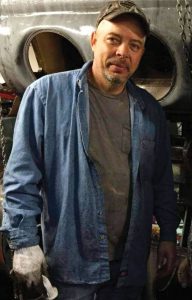Engineer Profile: David Wiley
David Wiley’s lifelong passion started in a familiar way: he picked it up from his father.

“I grew up working on mechanic stuff with my dad,” Wiley said. “I like making things run. That’s always been my passion.”
Wiley’s brother-in-law worked in the maritime industry, so by the time Wiley was in high school, he already knew what he wanted to do for a career. He wanted to combine his love for mechanic work with the maritime industry. He wanted to be an engineer.
“August 19, 1988, I caught my first boat, and I’ve been out here ever since,” he said.
Wiley, a native of Brookport, Ill., an Ohio River town just across from Paducah, Ky., first worked for Tennessee Valley Towing as a deckhand.
“After a year as a deckhand with Tennessee Valley Towing, I got in the engineroom as an oiler,” Wiley said.
When he went to work for Conti Carriers in 1991, Wiley started back on deck, but it wasn’t long before he was credentialed as an engineer. Then, beginning in 1995, he worked 10 years for Ingram Barge Line, where he served as chief engineer. He served in the same role for ARTCO before joining Parker Towing Company in September 2011 as training chief, in charge of recruiting and training vessel engineers from within.
When Wiley signed on with Parker Towing, though, the company sent him straight to Mobile, Ala., to be an engineer on site during construction of the mv. Megan Parker. Wiley said he appreciated the trust and confidence the company put in him as a new employee to immediately take on such an important task.
“I pretty much stayed on the job site,” Wiley said.
He was also heavily involved with the 2013 construction of the mv. Charles Haun, and he’s overseen much of the company’s other vessel refurbishments and engine overhauls over the years. Additionally, he was involved with the final outfitting of the company’s two recent new builds, the mv. Jared Phillips and the mv. Olive Parker.
With the two newest vessels now on the job, Wiley has moved back into a more traditional chief engineer and training chief role aboard the Olive Parker. He said he enjoys training and teaching young mariners to work in the engineroom, much like his father taught him.
In selecting a deckhand to train to be an engineer, Wiley said he first observes their work ethic and integrity on deck.
“I always watch the guys when they’re decking and their day-to-day routines,” he said.
Wiley puts a big emphasis on cleanliness and organization. He will also quiz the deckhand on general knowledge of tools and any kind of experience with engine repair. If everything checks out, Wiley will offer the deckhand a 90-day trial as a second engineer. During those three months, Wiley gives the trainee small tasks, like greasing in the engineroom and servicing the engines. Eventually, the trainee gets credentialed in fueling the boats. Wiley will also go over every system on the boat, with the trainee expected to eventually do the same without referring to notes.
Wiley said what he enjoys most is seeing the engineers-in-training gain and internalize that knowledge and put it into action.
“You’re giving him your knowledge,” Wiley said.
The goal is for a trainee to grow into a full-fledged vessel engineer within a year’s time. Parker Towing maintains an engineer on the company’s line-haul vessels.
What’s New, What’s The Same
Wiley was inspiring, and almost poetic, when he described the sense of accomplishment he has “when you tear an engine down to nothing, then rebuild it the way it should be, then start it up again.” That’s been a constant throughout his 33-year career, and it’s a joy he likes to pass on to young engineers. Still, as with the entire maritime industry, the engineroom has seen its share of changes over those three decades, Wiley said.
“The major change I see is that a lot of things have gone from mechanical to electronic on the engineering side,” Wiley said.
But that change has also brought opportunities for growth.
“To me, it’s another challenge, a chance to learn something new, something we haven’t seen before,” Wiley said. “It just broadens your knowledge, when you know you’re still trying to accomplish the same thing.”
While engineers today—and even more so in the future—will need training in the electronics field, they still have to learn the basics of engine maintenance and how to troubleshoot engine issues to keep vessels and commerce in motion. There may be more computers involved in engine maintenance today, but the task is still ultimately the same.
“Even if you have an electronics-based engine, it’s still just a mechanical engine wrapped in wires,” he said.



